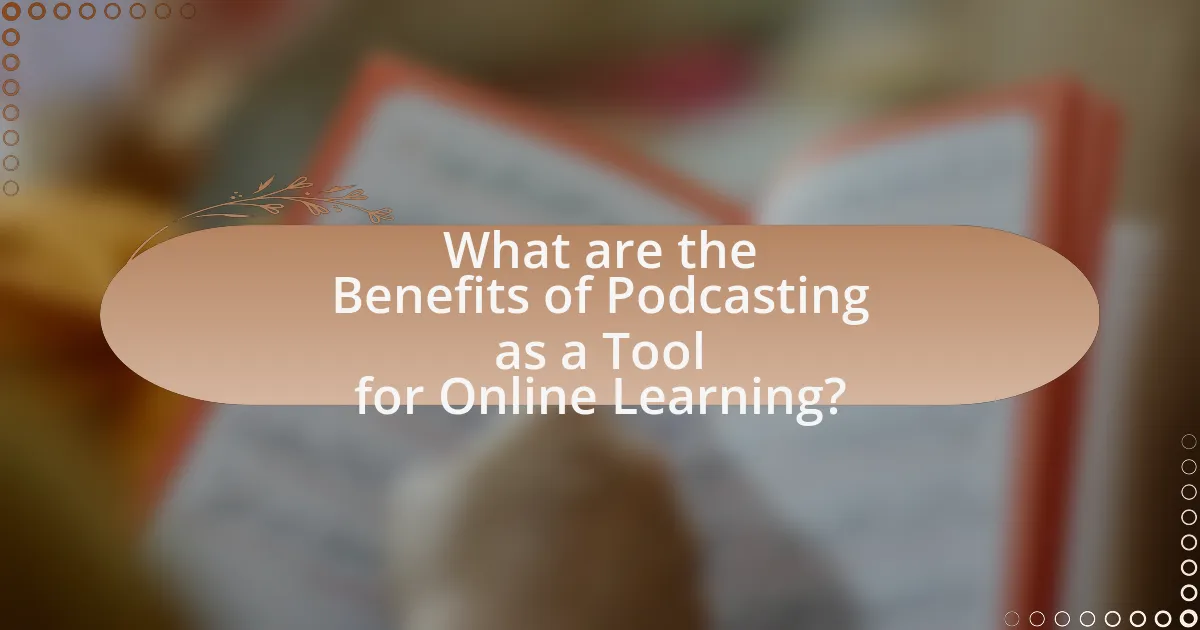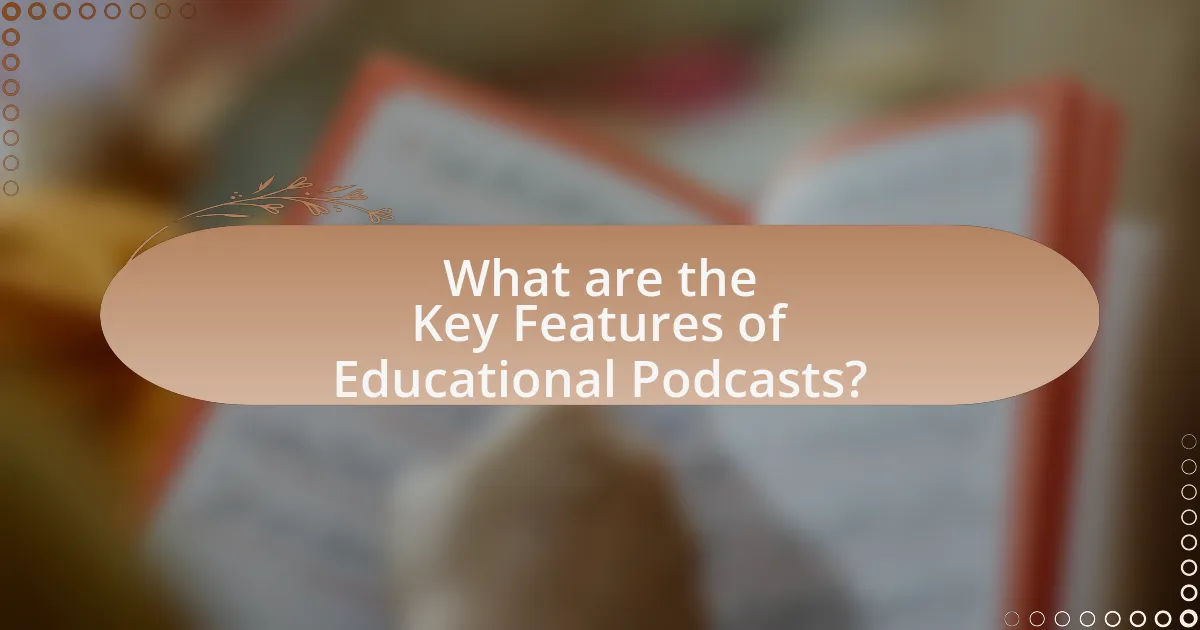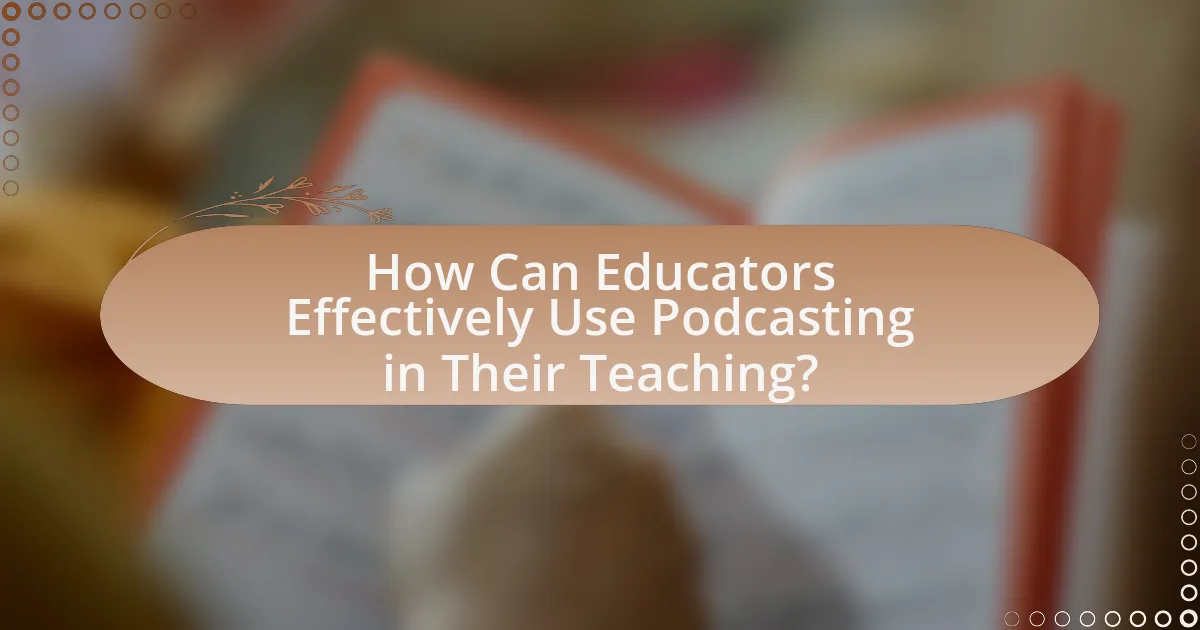Podcasting serves as an effective tool for online learning, offering benefits such as flexibility, accessibility, and enhanced engagement. It allows learners to consume content at their own pace and from various locations, catering to diverse learning styles. The auditory format of podcasts improves information retention and comprehension, making complex subjects more relatable through expert insights and storytelling. Key features of educational podcasts include structured content, interactive elements, and accessibility measures, which collectively enhance the learning experience and facilitate knowledge dissemination across different demographics.

What are the Benefits of Podcasting as a Tool for Online Learning?
Podcasting offers several benefits as a tool for online learning, including flexibility, accessibility, and enhanced engagement. Flexibility allows learners to consume content at their own pace and convenience, fitting learning into their schedules. Accessibility ensures that learners can access educational material from anywhere, as podcasts can be streamed or downloaded on various devices. Enhanced engagement is achieved through the conversational nature of podcasts, which can make complex topics more relatable and easier to understand. Research indicates that auditory learning can improve retention rates, with studies showing that learners often recall information better when it is presented in an engaging audio format.
How does podcasting enhance the learning experience?
Podcasting enhances the learning experience by providing accessible, on-demand audio content that caters to diverse learning styles. This format allows learners to engage with material at their own pace, facilitating better retention and understanding. Research indicates that auditory learning can improve information recall, as demonstrated in a study by the University of California, which found that students who listened to lectures via podcasts scored higher on retention tests compared to those who relied solely on written materials. Additionally, podcasts can incorporate expert interviews and real-world examples, enriching the learning context and making complex subjects more relatable.
What unique features of podcasting contribute to effective learning?
Podcasting contributes to effective learning through its accessibility, flexibility, and ability to engage auditory learners. The accessibility of podcasts allows learners to access content anytime and anywhere, facilitating learning in diverse environments. Flexibility enables learners to integrate educational content into their daily routines, such as during commutes or workouts, which enhances retention and understanding. Additionally, podcasts often feature storytelling and conversational formats that can captivate listeners, making complex topics more relatable and easier to comprehend. Research indicates that auditory learning can improve information retention by up to 20% compared to traditional reading methods, underscoring the effectiveness of podcasts as a learning tool.
How does audio content cater to different learning styles?
Audio content caters to different learning styles by providing auditory stimuli that enhance comprehension and retention for auditory learners, while also supporting visual and kinesthetic learners through storytelling and engagement. Auditory learners benefit directly from listening, as they absorb information through sound, which can improve their understanding of complex topics. Visual learners can enhance their experience by following along with supplementary materials, such as transcripts or visuals, while kinesthetic learners can engage with the content by taking notes or discussing it with peers, thus reinforcing their learning through active participation. Research indicates that incorporating audio content in educational settings can lead to improved learning outcomes, as it allows for diverse methods of engagement that align with various learning preferences.
Why is podcasting an effective medium for knowledge dissemination?
Podcasting is an effective medium for knowledge dissemination because it allows for flexible, on-demand access to information, catering to diverse learning styles. This format enables listeners to absorb content while multitasking, such as during commutes or workouts, which increases engagement and retention. Research indicates that auditory learning can enhance memory recall, making podcasts particularly beneficial for auditory learners. Additionally, the global reach of podcasts facilitates the distribution of knowledge across various demographics, breaking geographical barriers and promoting inclusivity in education.
What advantages does podcasting offer over traditional learning methods?
Podcasting offers several advantages over traditional learning methods, primarily through its accessibility and flexibility. Learners can access podcasts anytime and anywhere, allowing them to integrate learning into their daily routines, such as during commutes or workouts. This on-demand nature caters to diverse learning styles and schedules, enhancing engagement and retention. Additionally, podcasts often feature expert interviews and diverse perspectives, enriching the learning experience with real-world insights. Research indicates that auditory learning can improve information retention by up to 20%, making podcasts an effective tool for knowledge acquisition.
How does podcasting facilitate access to expert knowledge?
Podcasting facilitates access to expert knowledge by providing a platform where experts can share their insights and experiences directly with listeners. This medium allows for the dissemination of specialized information in an accessible format, enabling individuals to learn from industry leaders and subject matter experts without geographical constraints. According to a 2021 report by Edison Research, 41% of Americans aged 12 and older have listened to a podcast, highlighting the growing reach of this medium. Furthermore, podcasts often feature in-depth discussions, interviews, and case studies that enhance understanding and retention of complex topics, making expert knowledge more digestible for a wider audience.

What are the Key Features of Educational Podcasts?
Educational podcasts primarily feature accessibility, engaging content, expert insights, and flexibility. Accessibility allows learners to access information anytime and anywhere, making it convenient for diverse audiences. Engaging content is designed to capture attention through storytelling and relatable examples, enhancing retention of knowledge. Expert insights provide authoritative perspectives, often featuring interviews with professionals in various fields, which enrich the learning experience. Flexibility enables learners to integrate podcast listening into their daily routines, accommodating different learning paces and schedules. These features collectively enhance the effectiveness of educational podcasts as a tool for online learning.
How do educational podcasts differ from regular podcasts?
Educational podcasts focus on delivering structured content aimed at teaching specific subjects or skills, while regular podcasts typically prioritize entertainment or general discussion. Educational podcasts often feature expert interviews, instructional segments, and curated resources to enhance learning, whereas regular podcasts may include casual conversations, storytelling, or humor without a defined educational goal. For instance, a study by the Pew Research Center indicates that 49% of podcast listeners engage with educational content, highlighting the distinct purpose of educational podcasts in promoting knowledge acquisition compared to the broader entertainment focus of regular podcasts.
What elements make a podcast educational?
Educational podcasts incorporate several key elements: clear objectives, expert insights, engaging content, and interactive components. Clear objectives guide the learning process by defining what listeners should gain from each episode. Expert insights provide credibility and depth, often featuring knowledgeable guests or well-researched topics. Engaging content captures the audience’s attention through storytelling, relatable examples, or thought-provoking questions. Interactive components, such as listener feedback or Q&A segments, enhance engagement and reinforce learning. These elements collectively contribute to the educational value of a podcast, making it an effective tool for online learning.
How can the format of a podcast enhance learning outcomes?
The format of a podcast can enhance learning outcomes by providing an engaging and flexible auditory learning experience. Podcasts allow learners to absorb information at their own pace, facilitating better retention and understanding. Research indicates that auditory learning can improve comprehension, as evidenced by a study published in the Journal of Educational Psychology, which found that students who engaged with audio content scored higher on retention tests compared to those who relied solely on text-based materials. Additionally, the conversational style of podcasts can make complex topics more relatable and easier to grasp, further supporting effective learning.
What types of content are best suited for educational podcasts?
Educational podcasts are best suited for content that is informative, engaging, and structured to facilitate learning. This includes topics such as expert interviews, case studies, instructional content, and discussions on current trends in various fields. Research indicates that podcasts can enhance retention of information, with studies showing that auditory learning can improve comprehension by up to 60%. Additionally, content that incorporates storytelling or real-world applications tends to resonate more with listeners, making complex subjects more accessible.
Which subjects benefit most from podcasting as a learning tool?
Subjects that benefit most from podcasting as a learning tool include language learning, history, and science. Language learning is enhanced through auditory exposure to pronunciation and conversational skills, making podcasts an effective medium for immersive practice. History benefits from storytelling formats that engage listeners with narratives and historical context, allowing for deeper understanding. Science subjects leverage podcasts to explain complex concepts in an accessible manner, often featuring expert interviews that provide real-world applications and insights. These subjects utilize the auditory nature of podcasts to enhance comprehension and retention of information.
How can storytelling be utilized in educational podcasts?
Storytelling can be utilized in educational podcasts by creating engaging narratives that enhance learning and retention. This method captures listeners’ attention, making complex subjects more relatable and easier to understand. Research indicates that stories activate emotional responses, which can improve memory recall; for instance, a study published in the journal “Cognitive Science” found that narratives significantly enhance information retention compared to traditional teaching methods. By incorporating storytelling, educational podcasts can effectively convey lessons, illustrate real-world applications, and foster a deeper connection with the audience.

How Can Educators Effectively Use Podcasting in Their Teaching?
Educators can effectively use podcasting in their teaching by integrating it into their curriculum as a tool for delivering content, enhancing student engagement, and facilitating discussions. By creating or curating podcasts that align with learning objectives, educators can provide students with flexible access to course material, catering to diverse learning styles. Research indicates that 70% of students prefer audio content for learning, highlighting the effectiveness of podcasts in education. Additionally, podcasts can encourage active listening and critical thinking, as students analyze and discuss the content in class or in online forums.
What strategies can educators implement to create engaging podcasts?
Educators can implement several strategies to create engaging podcasts, including defining a clear purpose, incorporating storytelling, and utilizing high-quality audio. A clear purpose helps educators focus content, ensuring it aligns with learning objectives and engages the target audience effectively. Storytelling captivates listeners by making content relatable and memorable, which is supported by research indicating that narratives enhance information retention. High-quality audio is crucial, as poor sound quality can distract listeners and diminish engagement; studies show that listeners are more likely to continue with content that has clear and professional audio. Additionally, incorporating interactive elements, such as listener questions or feedback, can further enhance engagement by fostering a sense of community and involvement among the audience.
How can educators ensure their podcasts are accessible to all learners?
Educators can ensure their podcasts are accessible to all learners by incorporating multiple accessibility features such as transcripts, captions, and audio descriptions. Transcripts provide a written version of the audio content, allowing learners with hearing impairments to engage fully. Captions can enhance understanding for those who may struggle with audio clarity, while audio descriptions can assist visually impaired learners by narrating visual elements. Research indicates that 15% of the global population experiences some form of disability, highlighting the importance of these features in reaching a broader audience. By implementing these strategies, educators can create inclusive learning environments that cater to diverse learner needs.
What tools and resources are available for educators to produce podcasts?
Educators can utilize various tools and resources to produce podcasts, including audio recording software, editing programs, and hosting platforms. Popular audio recording software includes Audacity and GarageBand, which allow users to capture high-quality audio. For editing, tools like Adobe Audition and Hindenburg Journalist provide advanced features for refining podcast content. Additionally, hosting platforms such as Libsyn, Podbean, and Anchor enable educators to distribute their podcasts effectively. These resources are widely recognized in the podcasting community, ensuring that educators have access to reliable and user-friendly options for creating engaging audio content.
What are the challenges of using podcasting in online learning?
The challenges of using podcasting in online learning include accessibility issues, engagement difficulties, and the lack of interactive elements. Accessibility can be a barrier for learners with hearing impairments if transcripts are not provided, limiting their ability to fully engage with the content. Engagement can also be a challenge, as passive listening may not capture students’ attention as effectively as more interactive formats. Additionally, the absence of interactive components, such as quizzes or discussions, can hinder deeper understanding and retention of the material. These challenges highlight the need for careful consideration when integrating podcasting into online learning environments.
How can technical issues be addressed when producing educational podcasts?
Technical issues in producing educational podcasts can be addressed by implementing a structured approach that includes thorough planning, using reliable equipment, and conducting regular testing. First, creators should invest in quality microphones and audio interfaces to ensure clear sound quality, as poor audio can detract from the learning experience. Additionally, utilizing software for editing, such as Audacity or Adobe Audition, allows for the correction of audio imperfections and enhances overall production quality. Regular testing of equipment and software before recording sessions helps identify potential issues, allowing for timely troubleshooting. According to a study by the Pew Research Center, 64% of podcast listeners prioritize audio quality, underscoring the importance of addressing technical issues effectively to maintain audience engagement and facilitate learning.
What strategies can be employed to maintain student engagement through podcasts?
To maintain student engagement through podcasts, educators can employ strategies such as incorporating interactive elements, utilizing storytelling techniques, and providing supplementary materials. Interactive elements, like quizzes or discussion prompts, encourage active participation and reinforce learning. Storytelling techniques capture attention and make content relatable, enhancing emotional connection and retention. Supplementary materials, such as transcripts or additional readings, cater to diverse learning styles and provide context, further engaging students. Research indicates that these strategies can significantly improve student motivation and learning outcomes, as evidenced by studies showing increased retention rates when interactive and narrative methods are used in educational settings.
What are some best practices for integrating podcasting into online learning?
Best practices for integrating podcasting into online learning include creating structured content, ensuring accessibility, and promoting engagement. Structured content allows learners to follow a clear narrative, enhancing comprehension and retention. Accessibility is crucial; providing transcripts and captions ensures that all learners, including those with disabilities, can benefit from the material. Promoting engagement through interactive elements, such as discussion prompts or quizzes related to podcast episodes, fosters active learning and deeper understanding. Research indicates that these strategies can significantly improve learner outcomes, as evidenced by studies showing that structured and accessible content increases retention rates by up to 60%.
How can feedback be effectively gathered from students regarding podcast content?
Feedback can be effectively gathered from students regarding podcast content through structured surveys and interactive discussions. Surveys can include specific questions about content clarity, engagement, and relevance, allowing for quantitative analysis of student responses. Interactive discussions, either in-person or via online forums, provide qualitative insights and foster a deeper understanding of student perspectives. Research indicates that using a combination of both methods increases response rates and the richness of feedback, as students feel more comfortable sharing their thoughts in varied formats.
What tips can enhance the overall quality of educational podcasts?
To enhance the overall quality of educational podcasts, creators should focus on clear audio quality, engaging content, and structured episodes. Clear audio quality is essential, as poor sound can distract listeners and reduce retention; studies show that 70% of listeners abandon podcasts due to audio issues. Engaging content, which includes storytelling and relatable examples, keeps the audience interested and promotes better understanding. Structured episodes, with a clear introduction, body, and conclusion, help listeners follow along and retain information effectively. Research indicates that well-organized content increases listener comprehension and satisfaction, making these tips crucial for producing high-quality educational podcasts.